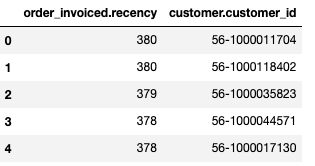Minerva Python Client¶
Overview¶
The Minerva Python client provides Python developers with a convenient way to interact with Minerva clusters, execute SQL queries, and retrieve data for analysis and exploration. It abstracts the underlying communication details and provides a user-friendly interface for sending queries and receiving query results.
The Trino DBAPI and SQLAlchemy libraries can be used to querying minerva clusters.
Prerequisites¶
- Python version >= 3.7
- Required libraries:
trino(client library),DBAPIandsqlalchemy(for database interaction). - Gather specific connection details: host: DataOS URL (TCP endpoint). port: default port for Minerva(presumably 7432). username: Your DataOS username. password: Your DataOS API key. http_scheme: Optional; the HTTP scheme to use (default: https).
Installation:¶
- Install the required libraries using
pippackage manager:
pip install trino
pip install dbapi //in case of DBAPI
pip install sqlalchemy //in case of sqlalchemy
DBAPI¶
The Python Database API Specification (DBAPI) defines a standard way for Python clients to access databases.
Connecting via DBAPI interface
The DBAPI implementation in trino.dbapiprovides methods to retrieve fewer rows for example Cursor.fetchone()or Cursor.fetchmany(). By default Cursor.fetchmany() fetches one row. Please set trino.dbapi.Cursor.arraysizeaccordingly.
The BasicAuthenticationclass can be used to connect to a Trino cluster configured with the Password.
Code Sample:
The code snippet shows how to use the trino.dbapi.connect() function with provided connection details to run a query on a Minerva cluster with the default port 7432. This example uses username and password credentials for authentication and is appropriate for establishing a connection to any cluster that relies on basic authentication.
It creates a cursor to execute SQL statements.
from trino.dbapi import connect
from trino.auth import BasicAuthentication
conn = connect(host="tcp.<env_url>", # eg: tcp.something.dataos.io
port="7432",
auth=BasicAuthentication("<username>", "<password>"),
http_scheme="https",
http_headers={"cluster-name": "<clustername>"} # Optional (Select Default Cluster)
)
cur = conn.cursor()
cur.execute("<sql statement>")
sample.py
user_id is DataOS user ID and user_token is API token that can be created in DataOS. To learn more about generating an API key/token, refer to Create API Key.
from trino.dbapi import connect
from trino.auth import BasicAuthentication
import pandas as pd
conn = connect(host="tcp.<env_url>",
port="7432",
auth=BasicAuthentication("<dataos_user_id>","<user_token>"),
-
http_scheme="https",
http_headers={"cluster-name": "<clustername>"} # eg:minervaa
)
cur = conn.cursor()
cur.execute("select city_id,zip_code from <catalog>.<schema>.<table> limit 10")
rows = cur.fetchall()
df = pd.DataFrame(rows,columns=["city_id","zip_code"])
print(df)
# for val in rows:
# print(val)
Output:
testdbapi.py
city_id zip_code
0 CITY1 36091
1 CITY2 36758
2 CITY3 36006
3 CITY4 36067
4 CITY5 36701
5 CITY6 36003
6 CITY7 36008
7 CITY8 36068
8 CITY9 36022
9 CITY10 36703
Process finished with exit code 0
import warnings
warnings.filterwarnings("ignore")
from trino.dbapi import connect
from trino.auth import BasicAuthentication
import pandas as pd
conn = connect(host="tcp.<ENVURL>",
port="7432",
auth=BasicAuthentication("USERNAME","APITOKEN"),
http_scheme="https",
http_headers={"cluster-name": "miniature"} # eg:minervaa and if not pass this parameter it'll connect to default cluster
)
q = """
SELECT
*
FROM
LENS (
SELECT
"order_invoiced.recency",
"customer.customer_id"
FROM
c360
limit 5
)
"""
res = pd.read_sql(q, conn)
res

SQLAlchemy¶
SQLAlchemy is a toolkit whose core component provides a SQL abstraction layer over many DBAPI implementations. It is another Python library for interacting with databases. The code includes importing necessary libraries (trino, trino.auth, pandas), establishing a connection, executing a query, and processing the fetched data using a Pandas DataFrame.
Connecting via SQLAlchemy
To connect to Minerva, use the connection string (URL). The URL contains information about the user, API key, host, port, catalog, and schema. It uses the default Minerva cluster to execute the query
trino://<username>:<password>@<host>:<port>/<catalog>/<schema>
eg:
trino://<userid>:<apikey>@tcp.<envurl>:<port>/<catalog>/<schema>
<host>: tcp.something.dataos.io
Example: sample.py*
This code snippet provides an example of connecting to Minerva using SQLAlchemy and executing a query. Similar to the DBAPI sample code, it imports libraries (sqlalchemy, pandas), creates an engine, establishes a connection, and fetches data.
from sqlalchemy import create_engine
from sqlalchemy.sql.expression import text
import pandas as pd
engine = create_engine('trino://<dataosuserid>:<user_apikey>@tcp.<env_url>.app:7432/<catalog>')
connection = engine.connect()
rows = connection.execute(text("SELECT * FROM <schema>.<table> limit 10")).fetchall()
df = pd.DataFrame(rows)
print(df.columns)
# for val in rows:
# print(val)
Output: